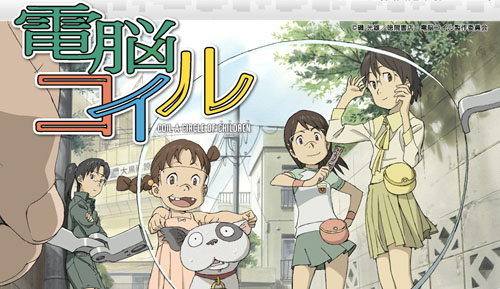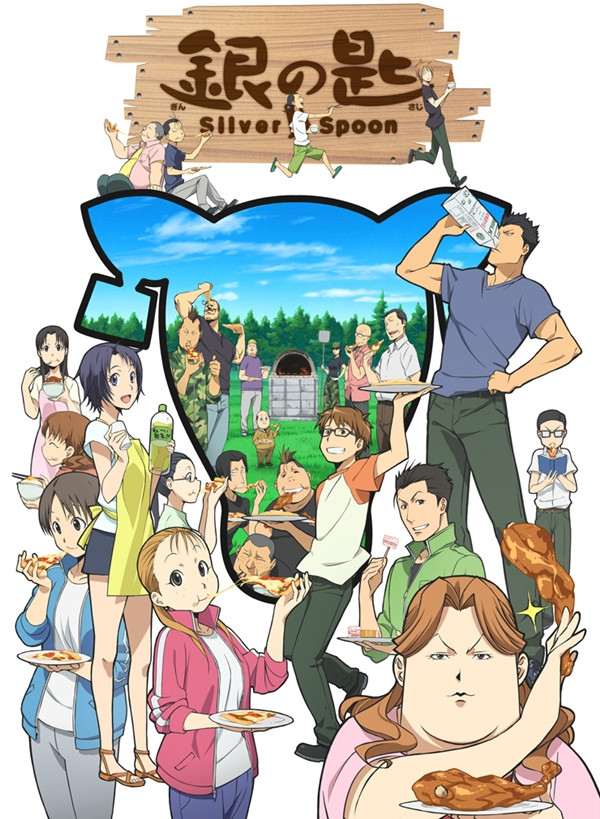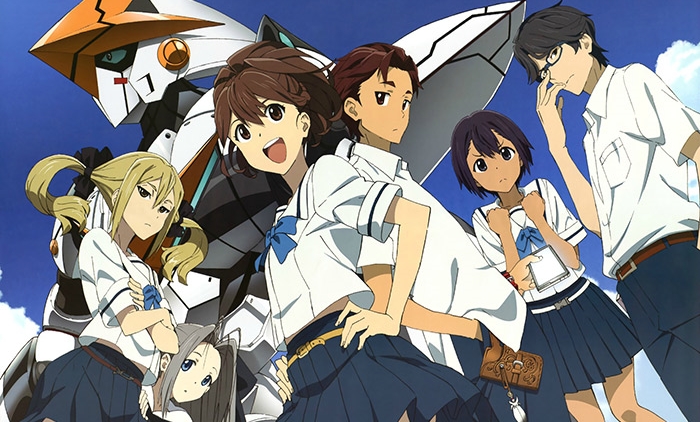Slice of life was never my favorite genre, but there are a surprisingly large number of excellent slice of life anime out there, some of them among my favorite shows of all time. Below I’ll highlight some of the best.
 JoJo’s Bizarre Adventure Part 4: Diamond is Unbreakable
JoJo’s Bizarre Adventure Part 4: Diamond is Unbreakable
Yes, this is slice of life and no, I’m not being ironic. Diamond is Unbreakable is the fourth part of the JoJo’s Bizarre Adventure Saga. This time around our protagonist is Josuke Higashikata. Josuke is a typical Japanese high school student living with his single mother in the seemingly quiet town of Morioh. He’s popular with the girls, has great hair, and is generally a pretty swell, if goofy and a little mischievous, guy.
Naturally, nothing is as it seems. It turns out Josuke is the son of Joseph Joestar, the protagonist of JoJo’s part 2. He has the Stand ability Crazy Diamond, which has the power to break apart and repair whatever it can punch. And not everything in the little town of Morioh is quite as quiet as it seems. In fact, you might say it’s all a little bizarre…
JoJo’s tends to tackle a different genre every part, and while slice of life isn’t the first thing you think of when you think of JoJo’s Bizarre Adventure, it is a surprisingly effective fit. The cast of part 4 is the most likable of all the JoJo casts, and this is in no small part due to the time we spend seeing them hang out and go on their weekly adventures. Despite having a spectacular villain in Yoshikage Kira (whose episodes are admittedly the best parts of the show), it’s that slice of life, teenagers-just-messing-around vibe that makes part 4 feel so unique. Of course, it helps that part 4 also has some of the coolest Stand battles in the entire series as well. Highly recommended.

Ancient Magus Bride
Chise Hatori is a sixteen year old Japanese girl who has totally given up on life. Unloved, unwanted, and alone, she makes the decision to sell herself into slavery, under the theory that at least the person who buys her would want her around.
At the auction she is bought for an enormous sum of money by a mysterious mage with a…cow?…horse?…skull in place of a head. The mage, Elias, is hundreds of years old, and after giving Chise a home in Britain and treating her with kindness, he tells her his true motive: To make her his apprentice and, one day, his bride.
“Ancient Magus Bride” is an utterly gorgeous show, both visually and musically, with one of my all-time favorite soundtracks – “Here” has to be one of the greatest OP songs of all time. It is impossible to listen to it and not understand the sort of show you’re about to see, to get a sense of the otherworldly fantasy that makes up its heart.
And heart is the name of the game. “Ancient Magus Bride” is full of heart. It takes its time, building up the unusual relationship between Chise and Elias and expanding its world. Luckily, both Chise and Elias – especially Elias – are compelling and fascinating characters.
But it’s no secret that the true draw of Ancienct Magus Bride is its setting. “Ancient Magus Bride” technically takes place in the modern day but feels timeless. The way it captures the world of fairies and magic is dead-on perfect: Dangerous, mysterious, and inhuman, but beautiful too. The rules are never fully explained but it all makes an intuitive sort of sense: This is just how magic works.
In its second half the show drops in quality a bit, but it’s nothing extreme – certainly not a “Death Note” level collapse. In fact I wouldn’t call it a collapse at all. It remains high quality until the end, though I have a big issue with a writing decision made in the finale. But that’s ultimately a small part of what is overall a fantastic, and highly superversive, show. VERY much recommended.

Dennou Coil
Dennou Coil follows the daily lives of a group of children who live in the fictional city of Daikoku. The children have adventures and navigate school and relationships. Nothing special. Your typical kid show….with one difference.
“Dennou Coil” takes place in a cyberpunk future where special glasses overlay a virtual world on top of the real one. The virtual world has realistic animal AI and is incredibly tactile, seemingly a part of the landscape as much as physical objects. Hacking is illegal, but in the kids’ world, hackers are at the top of the social totem pole. And maybe there’s more to the virtual world than meets the eye. Maybe it’s not so virtual after all…
Ah, I love “Dennou Coil”. It’s absolutely fantastic, up there with my very top tier of shows along with standouts like “Death Note”, “Fullmetal Alchemist: Brotherhood”, and “Silver Spoon”, among others. The setting is one of the coolest I have EVER seen. “Ordinal Scale”, which also used this idea, didn’t do it justice. All of the ramifications, good and bad, of such a system are thoroughly explored.
The animation and art style are also top notch. I’ve seen comparisons to Ghibli but I think the style is closer to Mamoru Hasoda than anything Ghibli has done. It feels incredibly distinct, and very fun to look at.
At the risk of sounding kind of social justice-y I also like the fact that the main character isn’t your typical adorable moe girl. She isn’t ugly or anything like that, but she’s average looking and kind of nerdy. It’s a refreshing change.
The mystery that undergirds the plot is also fantastic. The episodes leading up to the finale get increasingly intense, reaching an explosive and incredibly superversive climax. This is more than a merely excellent show, but a transcendently brilliant one up there with the greatest anime of all time. I can’t recommend it enough.

Haibane Renmei
An giant egg pops up out of nowhere in a mysterious town called Glie. A girl, who is soon given the name Rakka, hatches from the egg, where she grows wings after hatching. The girl has no memories of her life before she ended up in the egg, yet is able to talk and function normally; all she can remember is a vague dream of falling.
We learn quickly that this is a normal occurrence in the town. The winged people – who are soon given halos as well – are known as the Haibane. They live in abandoned buildings and can take or use whatever items the regular humans leave behind. Despite this arrangement the humans treat the Haibane kindly, and the Haibane in turn work various jobs throughout the town, up until the day they take their “Day of Flight” and leave forever. Throughout the show Rakka slowly learns more about the origins and secrets of the Haibane and about her best friend, Reki, the oldest Haibane who hasn’t yet taken her Day of Flight.
That’s a long set up for a pretty high concept show, and to its credit the show takes advantage of that concept. “Haibane Renmei” starts off as a dreamlike and fascinating slice of life, but as the story goes on and some of the mysteries slowly get answers the bits and pieces add up into a sort of psychological mystery centering around Rakka and Reki.
It’s hard to say anything more about it, because what makes this show great – and it is great – is best experienced without knowing about it in advance. It is an in-depth exploration of the themes of redemption and forgiveness, ending with the conclusion that life really does have inherent value and meaning. The slice of life elements are interesting because the setting and concepts being explored are interesting, but what brings it to the next level is the nuance and intelligence with which it explores its themes and resolves its character arcs. Once again, this is very highly recommended.

Silver Spoon
I already wrote about “Silver Spoon” at length, so I’m keeping this short. “Silver Spoon” is the story of Hachiken, an extremely intelligent first year high schooler who succumbed to intense pressure from his overbearing father and bombed his entrance exams. At the recommendation of a counselor he makes the decision to go to an agricultural school, presumably to get a new perspective on life. And that’s the story. No fancy sci-fi or supernatural elements here.
Mostly what I want to do now is clarify something: I don’t think I made it clear enough that I REALLY loved this show. It’s so good, it shares an honor with “Magi” as being the only unfinished anime whose story I decided to continue through the manga (which is also fantastic and highly recommended – man I hope it gets a season 3 one day…).
The characters are fantastic, and it shares the theme from “Fullmetal Alchemist”, Arakawa’s other masterpiece, of exploring the value of life, this time through the food we eat. The soundtrack is gorgeous and it has some of my favorite tracks in anime, like “Hello Especially”, which somehow manages to have a Japanese-country twang to it. Like “Dennou Coil” before it, this is a slice of life that transcends the category of “Great”. It is among the best anime I’ve ever seen, and I can’t recommend it enough. Considering it’s me we’re talking about, you KNOW it has to be great at everything it does if I’m recommending it despite it having no real action, magic or gadgets. It really is THAT good.

Robotics;Notes
Robotics;Notes is the story of Kaito and Aki, two childhood friends, now in high school, who start a robotics club with the goal of building a giant robot of their own and winning a robotics competition. As the story unfolds a conspiracy is discovered involving the company that makes the robotics ubiquitous in society, ultimately culminating in a one on one battle to, uh…actually I’ll let you all see that one for yourself.
Nobody ever really remembers “Robotics;Notes” exists, yet it was a big enough deal at the time it came out to get a dub. It’s too bad, because I honestly love the show. What makes it are Kaito and Aki. Kaito starts off looking dangerously like he’s going to become unbearable quickly, with the “gimmick” that he’s obsessed with video games and will only do favors for someone if they can beat him in a game. It becomes clear pretty quickly, however, that Kaito’s too-cool-for-school attitude is a persona he uses to cover up the fact that he’s a compassionate and kind person, willing to go out of his way to help people and prepared to make sacrifices for those he’s closest to.
Aki is great as well. She’s your typical super-cheerful anime heroine, whose boundless optimism and drive to accomplish her goals move much of the plot. Like with Kaito, this exterior masks an interior depth, with her optimism fueled largely by a deep-seated fear of failure and the ever-present feeling that she’s somehow disappointing her more intelligent older sister, whose parting words before leaving their home constantly haunt her. The likability of the leads is the main thing that keeps the viewer invested in their story.
The conspiracy underlying the whole plot ends up getting convoluted and more than a little absurd, but I can’t deny that it lead to more than one great scene and a cool as hell finale. It’s a shame this show has become so forgotten, because I highly recommend it.
Interesting side note: “Robotics;Notes” is one of a series of shows that takes place in the larger “Steins;Gate” universe, but outside of a couple of very subtle references this can basically be ignored completely.
I have watched two other slice of life anime, “Clannad” and “March Comes in Like a Lion”. While neither was bad, per se, I did not like either show for a variety of reasons I may go into another time.
I can confirm that, for those of you who like such things, each show has a very good dub but “Silver Spoon”, which has no dub at all, and “Diamond is Ubreakable” (“Clannad” also has a horrendous dub, incidentally). “Diamond is Unbreakable” may have a good dub, but I can’t tell you as I’ve never seen it.
I’m quite glad I decided to give slice of life a shot in the end. If I hadn’t, I’d have missed out on some excellent shows. Give them a shot and see for yourself.
Next up: Recommended comedies. It’s coming!
Strictly, one would say that _Haibane Renmei_ is a slice of _after_-life. It’s also likely that the town’s name is meant to be Gris, the French word for Grey.
Also worthy of consideration in the SoL vein — the classic _Aria_ (the one about gondoliers on Mars), and the more recent _Flying Witch_.
-
I actually tried a few episodes of Aria. I wanted to like it but just couldn’t get invested, I’m afraid. I may try again.
-
The Aria manga is glorious. The anime falls so short of it it’s not funny. Since it’s all about the beauty of Venice on Mars, the visuals are everything. The manga art is beautiful. The anime is drab and dull.
-